Maduro ends talks with opposition following imposition of new U.S. sanctions
Venezuelan President Nicolas Maduro has ordered his government’s representatives not to travel to Barbados for scheduled talks with the political opposition starting on Thursday, blaming new U.S. sanctions for the impasse.

Venezuela President Nicolas Madruo
Maduro “has decided to not send the Venezuelan delegation” for talks on Thursday and Friday with representatives of opposition leader Juan Guaido “due to the grave and brutal aggression” being “continuously … carried out by the Trump administration against Venezuela,” a government statement said late on Wednesday.
The two sides began meeting in Barbados in July to seek a resolution to the political stalemate in the country.
“Venezuelans have noted how the leader of the opposition delegation, Juan Guaido, has celebrated and promoted these actions that are harmful to national sovereignty,” the information ministry said in a statement.
“Venezuela is willing to review the mechanisms of this process such that its continuation is effective and in tune with the interests of the people.”
In an interview with Al Jazeera, Carlos Pina, a Venezuelan political analyst, said that Maduro’s reaction to the latest U.S. sanctions “was predictable”.
But the decison “does not imply that the government will leave the negotiating table permanently,” he said, adding that Caracas may be trying to buy time.
On Monday, U.S. President Donald Trump ordered a freeze on all Venezuelan government assets in the U.S. and barred transactions with its authorities.
The U.S. move, which follows repeated rounds of sanctions against Maduro, includes the authorization of penalties against “foreign persons” who provide support for his government, the U.S. national security adviser, John Bolton said on Tuesday.
Venezuela’s Vice President Delcy Rodriguez had called the latest U.S. sanctions a “global threat” and an attack on private property.
“Every country that has investments in the U.S. should be very worried because this sets a dangerous precedent against private property,” she said.
Pina, the political analyst, however said that since Venezuela had already been hit with previous sanctions on its oil and financial sectors, the latest round of economic penalties “does not translate in a radical change”.
Venezuela has been mired in a political impasse since January when opposition leader Guaido proclaimed himself acting president, quickly receiving the support of more than 50 countries, including the U.S.
Guaido invoked the constitution to assume a rival interim presidency on the grounds that Maduro’s 2018 re-election was fraudulent.
He said on Wednesday that Maduro could help the country by abandoning the presidential palace, Miraflores, “that way the sanctions will be lifted tomorrow”.
Guaido said the sanctions are “penalties for those who steal and profit from misery”.
The oil-rich, cash-poor country has been in a deep recession for five years. Shortages of food and medicine are frequent, and public services are progressively failing.
About a quarter of Venezuela’s 30 million-strong population is in need of aid, according to the United Nations, while 3.3 million people have left the country since the start of 2016.
_________________
Credit: Al Jazeera, www.aljazeera.com


















